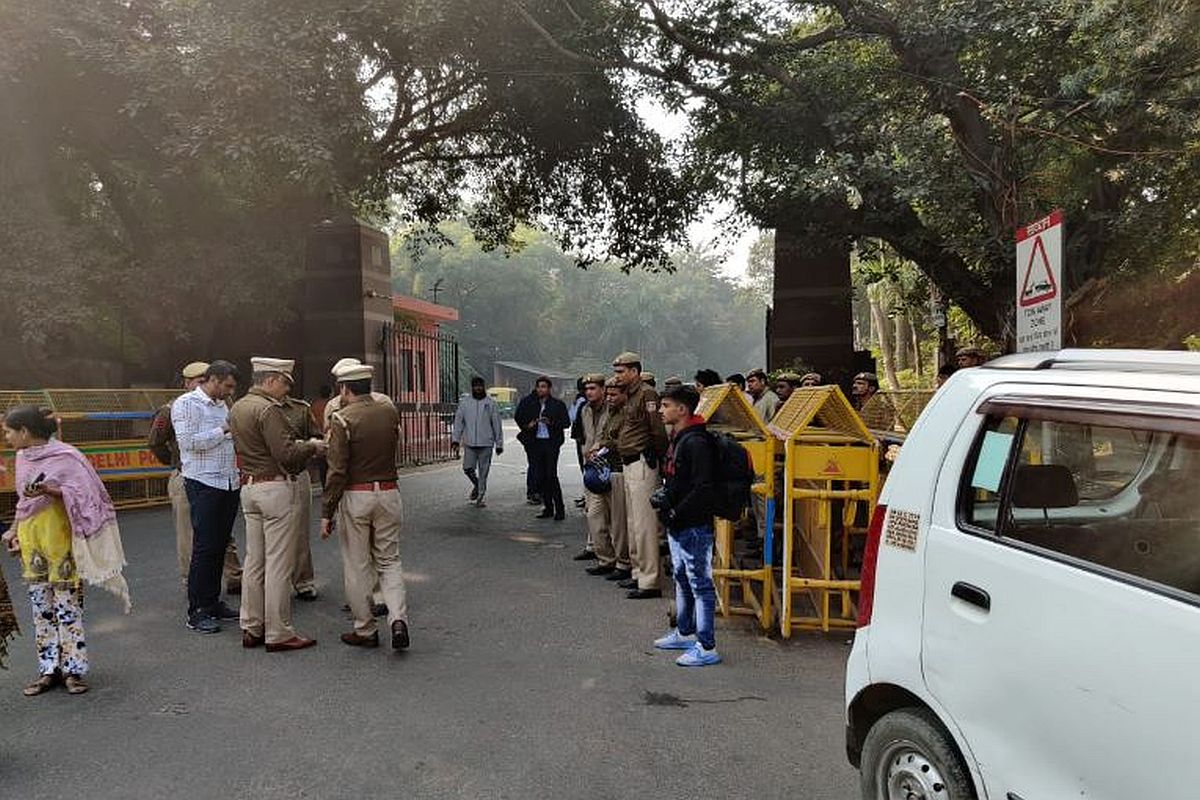Amir of Qatar receives Guard of Honour, ceremonial welcome at Rashtrapati Bhavan
Amir of Qatar, Tamim Bin Hamad Al Thani received the Guard of Honour and a ceremonial welcome in the forecourt of the Rashtrapati Bhavan on Tuesday.
A hostel draft manual has become a bone of contention between students and varsity administration since October 28 when the administration didn’t allow the JNUSU to attend the IHA committee meeting that was to clear it.

Police have barricaded the entire area near JNU. (Photo: Twitter | @JNUSUofficial)
Following the advice of the Delhi Police, entry and exit points at three Metro stations in Central Delhi have been closed in view of a planned march by JNU students to Rashtrapati Bhavan to protest hike in hostel fees.
“As advised by Delhi Police, entry & exit at Udyog Bhawan, Lok Kalyan Marg and Central Secretariat have been closed. Trains are not halting at Udyog Bhawan and Lok Kalyan Marg,” the Delhi Metro Rail Corporation (DMRC) tweeted.
Advertisement
Yellow Line Update
Advertisement
As advised by Delhi Police, entry & exit at Udyog Bhawan, Lok Kalyan Marg and Central Secretariat have been closed. Trains are not halting at Udyog Bhawan and Lok Kalyan Marg.
— Delhi Metro Rail Corporation (@OfficialDMRC) December 9, 2019
These are the main stations near to which most central government offices are located.
A march from JNU to President’s house was called by the Jawaharlal Nehru University Students Union (JNUSU) after their month-long protest failed to bear fruits as the administration rejected their demand of complete rollback of the proposed hike in hostel charges.
This March is for all the students of this country, and for the non-students too, to remind them that you have to fight, till you get your rights. We will not wait quietly. #FeesMustFall#EmergencyinJNU#ChatraPadayatra
— JNUSU (@JNUSUofficial) December 9, 2019
The JNUSU had earlier emailed a letter of their demands to the President.
In the letter, the students have demanded complete rollback of proposed fee hike, resignation of the Vice-Chancellor, withdrawal of police cases on the agitating students.
Meanwhile, the students’ march has been contained in the varsity as the police have barricaded the entire area and security forces have been deployed on every gate of the Jawaharlal Nehru University.
However, the students are trying to convince the security forces to let them go ahead with the march.
Earlier in the day, the Delhi police along with other security forces sealed all gates of the varsity which could have been used by students to march to the President’s house to present their demands.
Heavy deployment of forces was seen outside the varsity gates as water cannons, forces with lathi and tear gases guarded the roads outside.
All gates in and around JNU have been shut down by the Delhi Police. Huge numbers of barricades and police personnel.
Creating an emergency environment to try and stop the padyatra to Rashtrapati Bhavan.#FeesMustFall #EmergencyinJNU pic.twitter.com/7UT9GIivKP— JNUSU (@JNUSUofficial) December 9, 2019
Last month, entry and exit gates of Metro stations near Parliament were closed to prevent the students from approaching the Parliament.
Section 144 was imposed as the news of JNU students marching towards Parliament was out. The students defied the prohibitory orders and continued with their protest.
A hostel draft manual, introduced by the varsity, has become a bone of contention between students and varsity administration since October 28 when the administration didn’t allow the JNUSU to attend the IHA committee meeting that was to clear it.
The varsity administration argued the JNUSU had not been notified due to flouting of election rules. The draft hostel manual proposed to hike hostel charges from Rs 10 for double occupancy to Rs 300, and Rs 600 for single occupancy from the earlier Rs 20.
However, after student protests, the varsity administration announced a 50 per cent concession for the BPL category students, but it failed to pacify students. The issue is being handled by an MHRD’s high-powered committee, which has given its recommendations to the varsity administration after several meetings with students and their representatives.
Advertisement